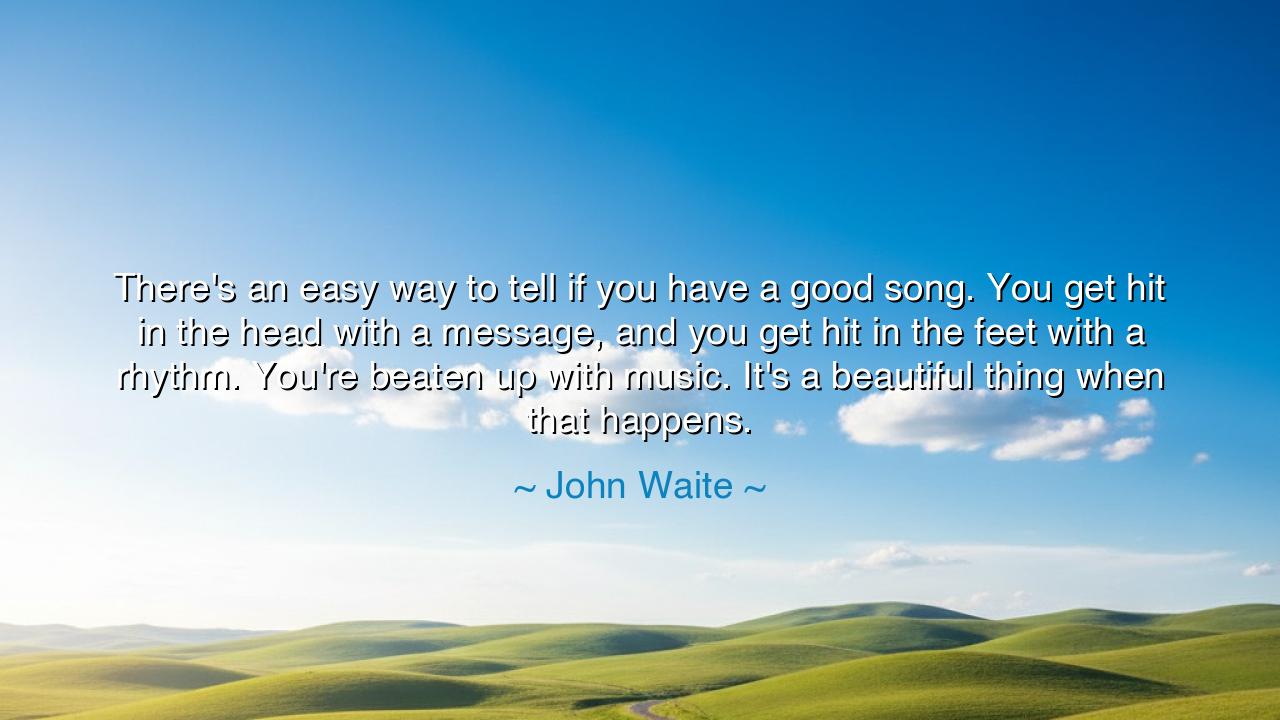
There's an easy way to tell if you have a good song. You get hit
There's an easy way to tell if you have a good song. You get hit in the head with a message, and you get hit in the feet with a rhythm. You're beaten up with music. It's a beautiful thing when that happens.






When the singer John Waite declared, “There’s an easy way to tell if you have a good song. You get hit in the head with a message, and you get hit in the feet with a rhythm. You’re beaten up with music. It’s a beautiful thing when that happens,” he gave voice to the eternal mystery of song—the union of mind, body, and spirit through sound. For music that is truly great does not only entertain; it compels, it moves, it seizes the listener and does not let go. It speaks to the intellect, stirs the emotions, and ignites the body into motion. A good song is not merely heard—it is lived.
The ancients too understood this union. The philosopher Plato taught that music enters the soul more powerfully than words, shaping character and destiny. The poets of Greece sang epics that carried both message and rhythm, instructing the people with wisdom while stirring them with cadence. The heart was struck with meaning, the body compelled to follow the beat. This dual force—thought and movement—was seen as divine, a gift of the muses to guide mankind. Waite, in his modern tongue, proclaims the same ancient truth: when song unites head and feet, mind and body, then it is truly beautiful.
History itself bears witness to this power. In the days of the American Civil Rights Movement, songs like We Shall Overcome were more than melodies. They carried a message of hope and defiance that struck the mind with clarity, while their rhythm bound marchers together, step after step, through fear and danger. People were literally “beaten up with music,” but it was this beating, this unrelenting pulse, that gave them strength to endure. In these songs, the intellect and the body moved as one, and history was changed.
In another age, the rise of rock and roll gave similar proof. Elvis Presley, with his voice and his hips, struck the youth of his time like lightning. His songs carried the message of freedom, rebellion, and joy, while the rhythm drove their bodies to dance in ways their parents had never imagined. Society felt “beaten up with music,” shaken out of old ways, and though scandalized at first, the world soon admitted: yes, it was a beautiful thing. Music had again proven its ability to transform.
The meaning is clear: a good song is one that unites the realms of being. The head receives the message—it teaches, inspires, awakens. The feet receive the rhythm—they move, they dance, they embody the joy or fury of the music. And the heart is caught between the two, stirred into something greater than itself. To be “beaten up with music” is not pain but liberation, for it is to be fully alive—thinking, feeling, moving in harmony with the song.
The lesson for us is this: do not be content with music—or with any creation—that touches only one part of you. Seek the things that stir your intellect and your body, your spirit and your strength. When you create, whether it be a song, a work, or even a life, let it carry both truth and rhythm, so that those who encounter it cannot remain still. The true power of art is not to leave people as they were, but to move them wholly, to strike them like thunder, to awaken both mind and body.
Practical wisdom follows. As a listener, seek music that both challenges and uplifts you. Do not settle only for rhythm without meaning, nor for message without movement. As a creator, strive to weave both together, so that your work carries the force of head and feet, of truth and joy. And in life itself, do not divide your thoughts from your actions: let your beliefs shape your steps, and let your steps give rhythm to your beliefs.
Therefore, let us hold John Waite’s words as a guide: “You get hit in the head with a message, and you get hit in the feet with a rhythm. You’re beaten up with music. It’s a beautiful thing when that happens.” For in such a moment, when truth and movement collide, we are reminded of the fullness of being alive. A good song does not simply pass through the ear—it transforms the listener, and in that transformation lies its beauty.






AAdministratorAdministrator
Welcome, honored guests. Please leave a comment, we will respond soon